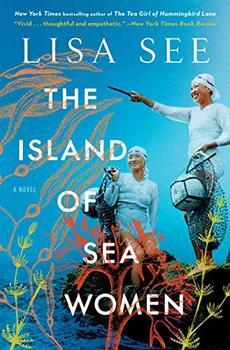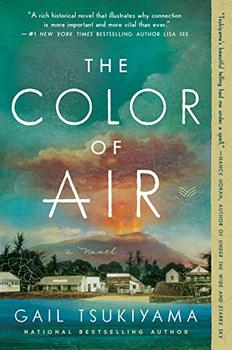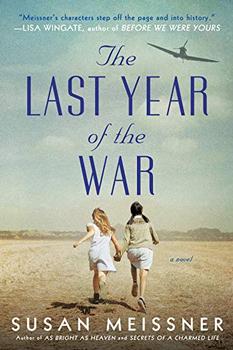Summary | Excerpt | Reading Guide | Reviews | Beyond the book | Read-Alikes | Genres & Themes | Author Bio

Lisa See's latest novel, The Island of Sea Women, follows the lives of Mi-ja and Young-sook, two haenyeos – women divers from the South Korean island of Jeju – who support their families by harvesting plants and animals from the ocean. (See Beyond the Book.) The book covers their shared journey and the region's history from the early 20th-century Japanese occupation, through WWII and the Korean War, to modern day conditions experienced by this remarkable society.
Fans of See's previous works will see parallels to her earlier novels here. Her plots typically explore the intimate friendships women form, while examining the impact history and politics have on these close relationships. See is a master at this formula, and her books seem to perfectly capture this dynamic without fail. It's tempting to think that she has covered this territory before, but what keeps readers coming back is her ability to uncover and highlight a tiny segment of a female population that survived in unique circumstances, in spite of the pain and the trauma they endure and the odds against them. The Island of Sea Women fits neatly with the rest of See's body of work. The story highlights the events that bring the two women together as well as those that drive them apart – forces that impact them directly but that are completely out of their control.
The research that went into this very specific, highly-ritualized society of women is exemplary. See relates the invocations the women traditionally recited and the songs they often sang as they began their day:
For a thousand years, for ten thousand years, I pray to the Dragon Sea God," Mother called out across the waves. "Please, ocean king spirit, no strong winds. Please no strong currents." She poured offerings of rice and rice wine into the water… "Every woman who enters the sea carries a coffin on her back," she warned the gathering. "In this world, in the undersea world, we tow the burdens of a hard life. We are crossing between life and death every day." These traditional words were often repeated on Jeju, but we all nodded somberly as though hearing them for the first time.
She goes on to relay many tiny details of the haenyeo's daily routine, such as the girls spitting on their knives for luck before their first dive of the day, or how they all learned to recognize each other's unique sumbisori – the sound one makes on resurfacing after a long period underwater.
See has the ability to bring her characters to life in a way few other authors can. Mi-ja and Young-sook, who are at the heart of the novel, face joy and tragedy throughout the decades, while always seeming authentic. Although they come from a different background and face trauma that most of us can't even imagine, they still share a core that many women will relate to, and they cope with the trials life throws at them in ways we hope we can emulate when our own existences become challenging.
Although I enjoyed the novel and learned a lot from it, I did not find it a particularly uplifting read. While it does focus on a group of incredibly strong women, it's also set during a period of time in the Korean Peninsula where women's contributions weren't valued and when life was cheap. I found it an emotional read – heartrending at times – that more sensitive readers may find difficult.
The Island of Sea Women will almost certainly extend See's streak of bestsellers. Every bit of it is as moving and intriguing as the other fine books in her catalog. This one will appeal most to those who enjoy novels about female friendships, as well as historical fiction aficionados. Also recommended to book groups as a fine selection for discussion.
![]() This review was originally published in The BookBrowse Review in May 2019, and has been updated for the
March 2020 edition.
Click here to go to this issue.
This review was originally published in The BookBrowse Review in May 2019, and has been updated for the
March 2020 edition.
Click here to go to this issue.

If you liked The Island of Sea Women, try these:

by Gail Tsukiyama
Published 2021
From the New York Times bestselling author of Women of the Silk and The Samurai's Garden comes a gorgeous and evocative historical novel about a Japanese-American family set against the backdrop of Hawai'i's sugar plantations.

by Susan Meissner
Published 2020
From the acclaimed author of Secrets of a Charmed Life and As Bright as Heaven comes a novel about a German American teenager whose life changes forever when her immigrant family is sent to an internment camp during World War II.
Too often we enjoy the comfort of opinion without the discomfort of thought.
Click Here to find out who said this, as well as discovering other famous literary quotes!
Your guide toexceptional books
BookBrowse seeks out and recommends the best in contemporary fiction and nonfiction—books that not only engage and entertain but also deepen our understanding of ourselves and the world around us.